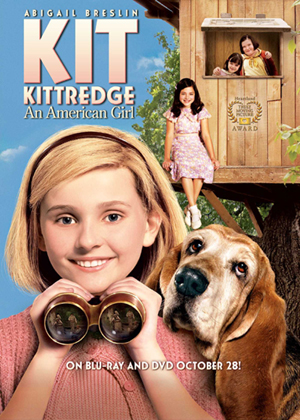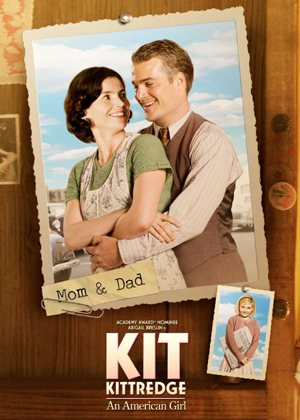Author Valerie Tripp is best known for creating new characters for American Girl (the phenomenally successful company founded by Pleasant T. Rowland in 1986 and acquired by Mattel, Inc. in 1998).
I am especially fond of the characters Tripp created for the Kit Kittredge series. Set in Cincinnati, Ohio, during the Great Depression, Tripp’s Kit books were the basis for the film
KIT KITTREDGE: AN AMERICAL GIRL starring Abigail Breslin in the title role, with Julia Ormand as Kit’s mother and Chris O’Donnell as her father.
When I learned Valerie was on her way to Chicago for a book signing event, I immediately requested an interview, and we met in the lovely dining room on the second floor of the new Chicago store at Water Tower Place.
*******
Jan Lisa Huttner: Did you create the character of Kit Kittredge entirely on your own, or did somebody come to you with ideas?
Valerie Tripp: From the very beginning of working with Pleasant Rowland (who created American Girl), we knew we wanted to do characters who lived at the time of the American Revolution, World War II and the Civil War.
I kept saying we should do a character who lived at the time of the Great Depression because I thought that was such a formative period for our culture and our country. All the editors kept saying to me: “Well, it’s too complicated. Girls who are 8, 9 and 10 won’t understand foreclosure. They won't understand eviction. They won’t understand mortgages. They won’t understand any of that.” And I kept saying: “Trust me. I can write this so that they will understand it.” This was about ’87 or so. It wasn’t until 2000 that I actually started to write about Kit.
The other person who deserves tremendous credit for Kit is my mother. Kit was exactly the same age as my mother when her father lost his job in the Depression. My mother grew up Utica, New York. Her family had to take in boarders to help pay the rent, so she had to start doing chores to help take care of the boarders. She had to move into the attic; she wanted to be a reporter.
Jan: So Kit’s story was really personal! Is your mom still alive?
Valerie: No, but she read the Kit books and she was very pleased. Kit was truly inspired by my mother’s life and story. The other American Girl characters I did create out of whole cloth; they were very influenced by the historical period that they lived in. And in my mother’s case, she was very influenced by the historical period she grew up in, so I just translated it into Kit’s story.
Jan: So it’s 2000, you finally get the go ahead from American Girl, and there’s a recession at that point in time after the dot-com crash?
Valerie: Not too much of one, though. When I started to write the Kit books, our country was in a flourishing period and in fact children were experiencing something they called “affluenza”—the effect of too much money floating around. The stories came out about 2001, before 9/11.
Still I didn’t find it difficult to explain to children. I remember before our current crash, when I would visit schools and talk about Kit, I would say, “All of us know about losing things. We all know about changes. We all know about making adjustments that we don’t want to make.”
In Kit’s case, she had had to learn, for example, to be very thrifty and how to use something until she wore it out because her family couldn’t afford to replace it. I’ll also say to the girls, “We don’t waste things because we are mindful of the environment, so I know all of you girls don’t waste water or electricity. You don’t waste your time, you don’t litter because you’re careful and you know how fragile our environment is.”
And they get it! Girls are so smart. They always bring more to these stories and bring more out of the stories than even I ever imagined. It’s so wonderful to write for girls. They’re so grateful.
Jan: Then, of course, the worst happens and it’s actually the case that people are losing their homes and losing their jobs. If you want to understand what happens to a family during times like this, the first half hour of
KIT KITTREDGE: AN AMERICAL GIRL
will tell you a hundred times more than anything in UP IN THE
AIR. The look on Kit’s face when she sees her father on line at the soup kitchen…
Valerie: When I was writing the books, I really thought it’s more difficult to face your child than anything else. I wanted that moment where they’re in the soup kitchen and Kit realizes: “My father has been lying to me.” And he realizes: “Oh, she knows now.” And he has to go explain to her: “I didn’t want you to know. I’ve been pretending that I was full and sharing my meals at home.” That’s the hardest part—to lose your dignity in front of your child.
Jan: And it’s brilliant, Valerie. You created all of Kit’s sorrow, and then introduced Grace (the abandoned dog).

Valerie: I was trying to show that no matter how badly off you are, there’s someone in even more desperate straits than you are. I wanted to show that another family was so desperate they couldn’t even afford to feed their dog anymore.
Grace is also a story of redemption and rehabilitation. She’s just a broken down old dog, but Kit’s family takes her in, loving her and feeding her, and she comes back to life. I love the character of Kit and that relationship. Grace just feels like everybody’s old friend.
Jan: Did your mom have a dog?
Valerie: No. That was sort of something that came out of me—the idea that, in fact, it’s very healthy to realize there’s somebody who needs my help. I think that that cheers us all up actually, that you think: “Oh, you know what, I can do service to another creature.”
Jan: Talk a bit about Kit’s mom.
Valerie: I love the character of Margaret Kittredge and how much she learns and changes. She starts out in
MEET KIT wearing a cool green dress with every hair in place and everything perfect, and then as we go through the book, Mrs. Kittredge makes a tremendous journey. She surprises herself with that idea, “the brainstorm” as she calls it, of taking in boarders. And she surprises herself with the way she can stand up to Uncle Hendrick and say: “Yes, we’re going to do this.” She surprises herself by how hard she works and how thrifty she learns how to be.
When I write American Girl books, I try to have the mother’s journey be as important as the child's journey—to show girlhood/womanhood at all different ages and levels.
Jan: What’s the combination of satisfaction and sorrow now, in finding yourself in “the Great Recession” of 2010? I know you don’t want to say, “I told you so.”
Valerie: I don't want to take any credit for being prescient. But I do feel happy with the Kit books’ underlying message, which is really the economics of your family isn’t what’s going to make or break it. That isn’t what is holding your family together or even making your family happy. In fact, everybody in your family rising to their strengths as the Kittredges do—that’s what makes them happy.
In every American Girl book, I try to say to the girls who are reading the books: “You’re like these characters, in that a lot of things are going to change, including you. The characters are not the same at the end of the books as they are at the beginning, and they’re going to face challenges and troubles. But they’re going to be fine and you’re going to be fine too. You are going to be fine.”
So I’m happy that the Kit books are out there for girls to read right now. I can't say I’m happy that the words echoing into their own lives may be: “I’ve lost my job.” They may have heard the word “foreclosure.” I don't want them to have to suffer that, but I do want them to know it’s possible to come through an experience like that.
Jan: It’s so important that people understand that—it’s not the things outside, but the things inside. And you’ve created all of this, Valerie. You created a banquet for the imagination before people knew they would need it. And now that they do need it, well, Kit and Grace and the Kittredge family members are all there for them.

Valerie: I’m invited to speak by schools, Brownie Troops, libraries and book groups, including mother/daughter book groups and American Girl book groups. Now, when I speak, I know the girls are very familiar with friends who’ve had to move or undergone radical changes because of the economic differences in their lives. Just like in the Kit books.
Jan: Let’s talk about your own schooling. Were you a history major at Yale University?
Valerie: Actually, I majored in philosophy, and that turned out to be a very good background because what I do at American Girl is take a complicated historical concept and then try to distill it.
I’m a feminist, and I’m very proud of being one. I grew up in a house full of girls. I had three sisters and one brother. To loop back to Kit in a way, one of the messages I learned from my mother growing up was you have to be able to get a job. It wasn’t so much self-actualization and self-fulfillment as knowing how to support ourselves and how to work. It was because of her Depression experience that my mother thought: “You need always to be able to take care of yourself because you don’t know what life has in store.”
I was lucky to have parents who said: “Look, you have a brain and school is your chance.” I can remember my mother saying: “School is your job.”
Jan: Kit has a brother too, and you have Charlie leave home to go work in the
Civilian Conservation Corps
(CCC). So what do you think now, when you listen to President Obama argue for a government stimulus package?
Valerie: I think the CCC did fantastic stuff! My husband’s a great national park advocate and he worked at Glacier Park, so he will say: “See the
CCC built this road. The
CCC
built this retaining wall.” So I always thought that was a great thing.
It was very important to me to talk in the Kit books about the
CCC
and President Roosevelt’s other work programs as well, like the
Works Progress Administration
(WPA). The WPA sent reporters and photographers out to catalog, to collect recipes, to take photographs, to make us conscious of our heritage. That was tremendously exciting and very rich and very worthwhile.
So when I hear about a stimulus package, when I hear about what Obama is trying to do now, I would like to shake the American people and say: “Listen, don’t think somebody else is going to make this better. If it’s going to be made better, you’re going to have to help make this better, you and your family.”
